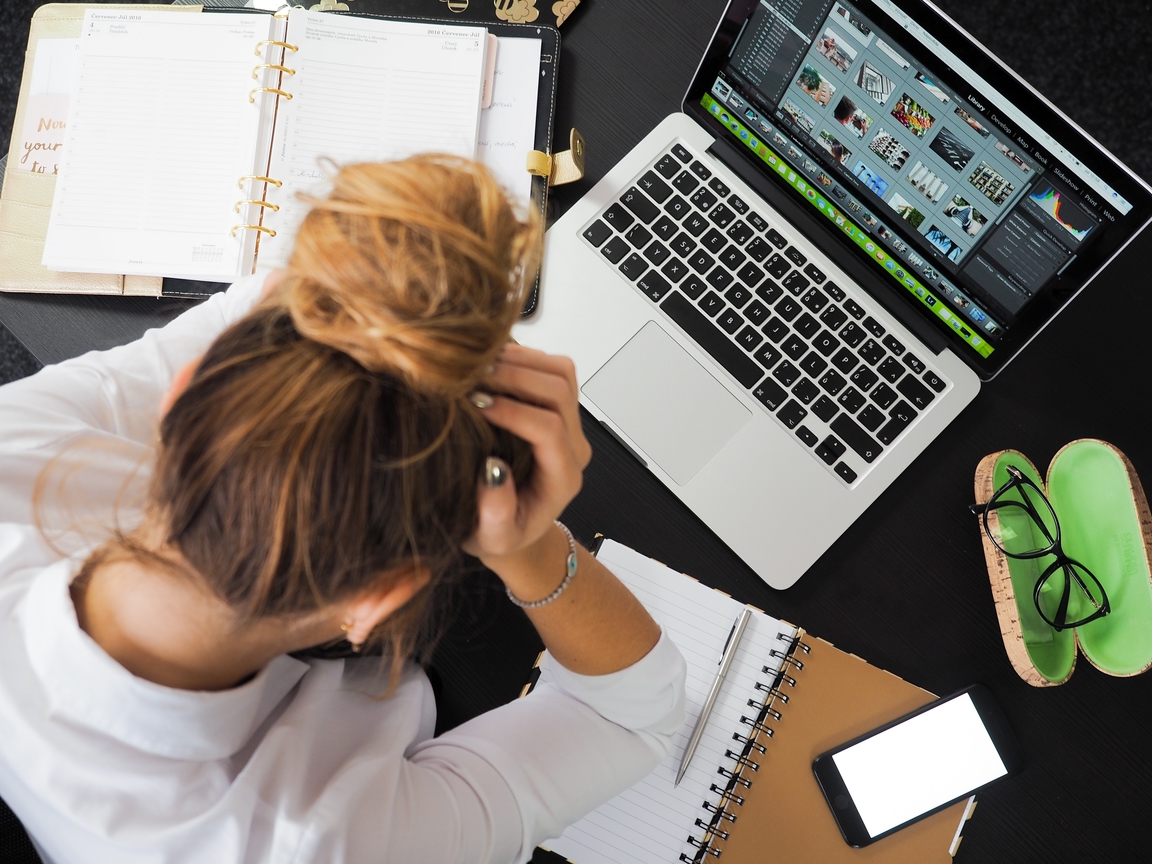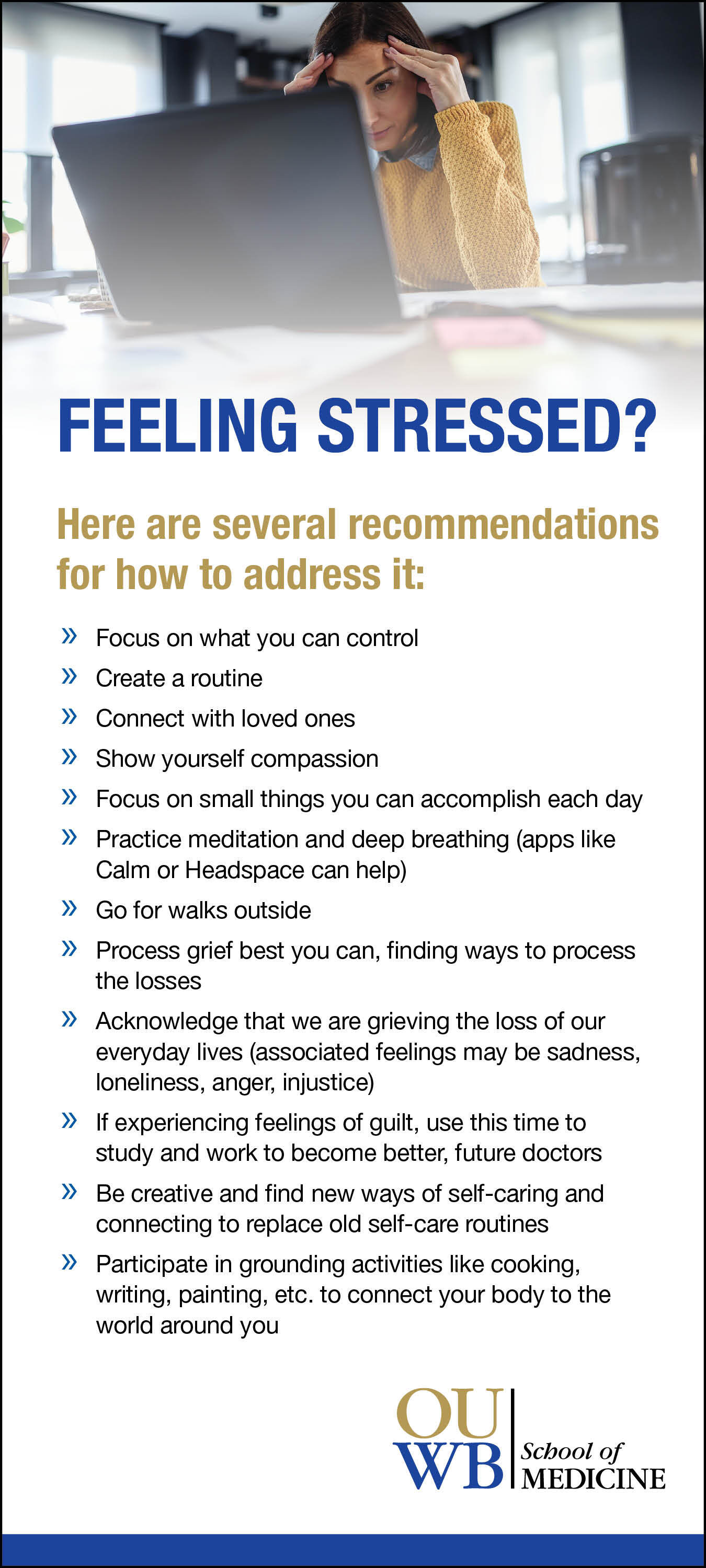
Before COVID-19, Oakland University William Beaumont School of Medicine social worker Janae Kinn, LMSW, was busy helping students manage their respective journeys through medical school.
After COVID-19 — aka a period of “uncertain times” — things are different.
That’s because in addition to the rigors associated with becoming next-gen physicians, a whole new set of stressors has come about as a result of the pandemic.
On top of uncertainty, there’s anxiousness, adjusting to new routines, and dealing with grief — for loved ones impacted by the disease and also for the loss of our daily lives, time spent with friends, and essentially, life as we knew it. There may even be feelings of guilt for some students who feel they are not helping on the frontlines, or chose a specialty where they are not on the frontlines.
 “Recognize your feelings and avoid shaming yourself for having them —it is human to experience these feelings and this is an unprecedented, scary time,” said Kinn. “Whatever you’re feeling is OK, and acknowledging this and being kind to yourself for having the feelings you’re experiencing will help ground you.”
“Recognize your feelings and avoid shaming yourself for having them —it is human to experience these feelings and this is an unprecedented, scary time,” said Kinn. “Whatever you’re feeling is OK, and acknowledging this and being kind to yourself for having the feelings you’re experiencing will help ground you.”
To make it through, Kinn offers several suggestions — starting with reminding students to remember that the work they’re doing remains vitally important, regardless of setting.
“We might feel helpless during this time if we want to help others in the hospital and are unable to, but we can control how much we study so that we can be most helpful to our patients one day,” she said.
Focusing on what you can control is key, Kinn said.
“While we may not have control over our exam schedules or the end date of the pandemic, we can still choose to eat healthy, get a good sleep each night, exercise, and do our work,” said Kinn. “We can still choose to work hard for results we are proud of.”
For students who are particularly overwhelmed with assignments, Kinn suggests focusing on completing one lecture rather than those they might be behind on.
“Completing one is better than none, and the sense of accomplishment may drive you to keep going from being able to meet a more attainable goal,” Kinn said.
Connecting virtually is especially important, according to Kinn.
“I prefer the term ‘physical distancing’ rather than ‘social distancing’ because it is still important to socialize with others, and it is easier to feel isolated during this time,” she said. “Whether you are studying with a friend online with your microphones muted, having a game night with friends online, video chatting with a family member while you cook dinner or go for a walk, or sending a letter to a loved one, do something to stay connected.”
But Kinn suggests it’s not all about being in front of a screen.
For example, she said it’s equally important to create a clear, established routine.
“Set a daily agenda for the next day around dinner time, before you begin evening activities,” she said. “Include everything you hope to accomplish the next day, including schoolwork and non-schoolwork.”
Such a list could include meals, phone calls with family and friends, making time for art, and more.
“The purpose of this agenda is to act as an outline or guide for what you wish to accomplish the next day,” she said. “If you do not finish everything on your list, that is OK. You can start smaller too, such as simply waking up at the same time every day, performing your usual morning breakfast routine, or going to bed at the same time every night.”
Kinn recommends a big part of the daily routine include plenty of self-care.
“Find an online yoga community, go for walks outside, try a new hobby, play some music, write a poem or short story,” she said. “Dedicate time to find new ways to ground yourself and integrate this into your daily routine.”
Above all, Kinn reminds students to keep looking ahead — beyond the COVID-19 pandemic.
“Remind yourself this is temporary,” she said.
“Stay knowledgeable about what is going on with the world, but be careful that the information you are consuming is helping you and not hurting you. Seek out positive information and news as well.
“Remind yourself that statistically the majority of people who contract COVID-19 recover,” she added. “We do not want to minimize what is happening, but it’s easy to feel like the sky is falling down during these unprecedented times of fear and stress. Show yourself compassion and rest when you need to.”
For more information, contact Andrew Dietderich, marketing writer, OUWB, at [email protected].
Follow OUWB on Facebook, Twitter, and Instagram.
NOTICE: Except where otherwise noted, all articles are published under a Creative Commons Attribution 3.0 license. You are free to copy, distribute, adapt, transmit, or make commercial use of this work as long as you attribute Oakland University William Beaumont School of Medicine as the original creator and include a link to this article.

